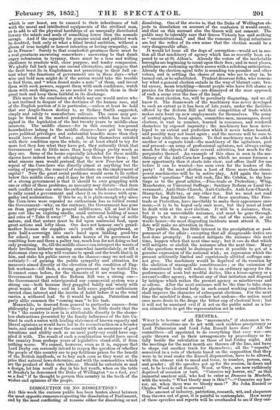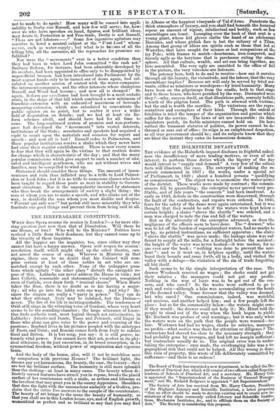FRUSTRA.
WHAT is to become of all the "movements," if statesmen in re- sponsible situations are to act with such reckless precipitancy as Lord Palmerston and Lord Sohn Russell have done ? All the committees—all appointed to do everything that ever was—are quite thrown out in their arrangements by proceedings so to- tally beside the calculation as those of last Friday night. All the meetings for the next month are thrown off the line, and have to shape out another track for themselves ; all the "reports," conceived in a vein of rhetoric based on the supposition that they were to be read under the Russell dispensation, have to be altered, with the utmost risk to mood and tense, to number, person, ease, and gender ; all the speeches got up for the session, in-doors and out, to be levelled at Russell, Wood, or Grey, are now ruthlessly deprived of occasion or butt. "Conceive my horror, sir," as that immortal amateur said, who had to enter as Duncan in Macbeth, with the words, "What bloody man is this ? "—" Conceive my hor- ror, sir, when there was no bloody man !" No John Russell or Charles Wood to call to account!
The amount of industry, patriotism, research, wit, and eloquence thus thrown out of gear, it is painful to contemplate. How many of these speeches and reports will be overhauled to see if they can- not be made to do again! How many will be coaxed into appli- cability to Derby vice Russell, and how few will serve ; for, how- ever we who have speeches on hand, figures, and brilliant ideas, may desire it, Protection is not Free-trade, Derby is not Russell, "Fleas are not lobsters—" Some few ingenious agitators may contrive to level a neutral subject at the "First Lord" whom- soever, such as water-supply ; but what is to bessme of all the telling bits, all the sarcasms, all the reproaches for promises un- fulfilled?
Nor were the " movements " ever in a better condition than they had been in when Lord John committed 4# the rash act." Sanitary Reform, for instance, had been admirably developed by its creators, had been appointed to office only to be disappointed by superofficial treason, had been introduced into Parliament by the most august hands only to be turned out of doors again, had cal- culated on another session of contest with the water-companies the interment-companies, and the other interests whose champions Russell and Wood had become ; and now all is changed ! So again, Reform par excellence had been brought to a most ecstatic crisis, in the shape of that bill which combined a new minimum of franchise-extension with an unheard-of maximum of borough- mongering-extension, which was calculated to concentrate the public opinion on no point, but to scatter it over a wider field of disputation on details ; and we had at least six Re- form schemes afield, and should have had for all time to come. The long-continued system of promise and non-perform- ance had developed the "movements " into vested interests, institutions of the State ; secretaries and speakers had acquired a riyht to count upon the materials and occasion for report and speech: and now all is lost ! Russell cedes to Palmerston, and those popular institutions receive a shake which they never have had since their regular establishment. There is now every reason to fear that they will again be the victims to that restless desire for change which is characteristic of the day ; and that the many popular commissions which give support to such a number of edu- cated and intelligent gentlemen, who are not without wives and families, may be compelled to wind up.
Statesmen should consider these things. The amount of incon- venience and ruin thus inflicted may be a trifle to Lord Palmer- ston or Lord John ; but it is no trifle to numerous classes who have been taught to regard these posts as next in stability to Govern- ment situations. Nor is the unpopularity incurred by statesmen who thus break the arrangements of society a slight thing: the man at whom you are to make a speech, and who slinks out of the way, is decidedly the man whom you most dislike and despise. " Pereant qui ants nos !" but perish still more miserably they who frustrate our good things and prevent them from being said at all.



























 Previous page
Previous page